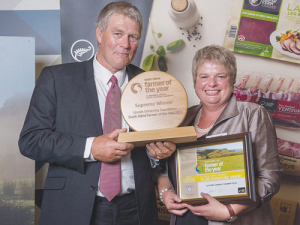Wired for Science: Understanding the feeding habits of mealybug
Fussy children might be frustrating, but fussy mealybugs could help protect the New Zealand wine industry from grapevine leafroll-associated virus 3.
 Fairlie farming couple Neil and Lyn Campbell with the Lincoln University Foundation Farmer of Year and Plate to Pasture awards announced in November last year.
Fairlie farming couple Neil and Lyn Campbell with the Lincoln University Foundation Farmer of Year and Plate to Pasture awards announced in November last year.
A South Canterbury couple have been named the 2016 Lincoln University Foundation Farmer of the Year, based on a detailed and analytical approach to farm management.
Neil and Lyn Campbell farm 769ha of rolling hills and flats in Middle Valley, just east of Fairlie, running sheep and deer and producing a variety of crops.
Chief judge Nicky Hyslop cited the Campbells’ “efficient, incredibly flexible and adaptive” approach to developing their dryland property. Their focus had been on systems to generate the most profit at the most effective time, with land stewardship always the foundation of their decisions.
Hyslop says that when the Campbells moved to their property their aim from the start was to be in the top 10% of producers. They not only changed how the property was run, they instigated analysis systems so every aspect of the farm operations could be measured and compared against key performance indicators.
“Neil and Lynn use accurate data to validate their decisions,” Hyslop says. “There’s no reliance on hunches or assumptions. Hard data is analysed to compare and choose between the different enterprises on the farm.”
Hyslop says the farm’s small paddock sizes also allow for specialist crops to be grown – oat and grass seed, and rape seed for oil -- for maximum return.
“We can’t compete on volume and, likewise, we aren’t big enough to compete by going straight to the market,” Neil Campbell says. “So our best option is to deliver each product at the time when it is most profitable.
“We go from summer dry valley floor to higher altitude moist hill country. Some of the things we are doing at altitude are more common at sea level, like growing crops. The diversity of our business gives us strong balance environmentally and financially.”
The Campbells hope the farm remains in the family and the judges noted their succession planning. Their aim is for a sustainable and environmentally compatible farm producing nutritious food.
“Our biggest and most important goal is to continue to enjoy what we do,” Campbell says. “Farming is a fantastic industry; if we can be part of telling that story and encouraging the younger generation into the industry we will be satisfied.”
The Campbells’ prize a $20,000 travel and study grant. As part of their win they will also host a field day at the farm in early April.
Global trade has been thrown into another bout of uncertainty following the overnight ruling by US Supreme Court, striking down President Donald Trump's decision to impose additional tariffs on trading partners.
Controls on the movement of fruit and vegetables in the Auckland suburb of Mt Roskill have been lifted.
Fonterra farmer shareholders and unit holders are in line for another payment in April.
Farmers are being encouraged to take a closer look at the refrigerants running inside their on-farm systems, as international and domestic pressure continues to build on high global warming potential (GWP) 400-series refrigerants.
As expected, Fonterra has lifted its 2025-26 forecast farmgate milk price mid-point to $9.50/kgMS.
Bovonic says a return on investment study has found its automated mastitis detection technology, QuadSense, is delivering financial, labour, and animal-health benefits on New Zealand dairy farms worth an estimated $29,547 per season.

OPINION: Here w go: the election date is set for November 7 and the politicians are out of the gate…
OPINION: ECan data was released a few days ago showing Canterbury farmers have made “giant strides on environmental performance”.